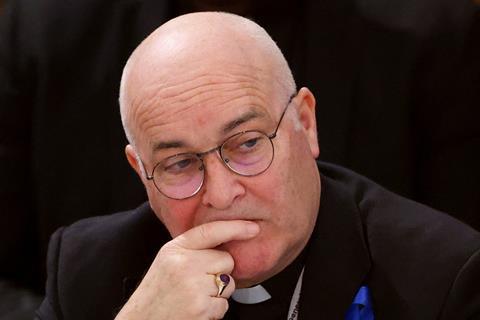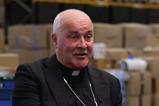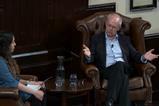If the Church of England is to see real change, it needs leaders to be accountable for when things go wrong, says Rev Dr Ian Paul in an open letter to Most Rev Stephen Cottrell, Archbishop of York

Dear Stephen,
In our working relationship, I have always sought to be open and honest with you. I have also always sought to follow Jesus’ teaching in Matthew 18: if you have an issue with a brother, go to him first privately, and only if he will not listen should you then go to others, and make it public.
That is why I wrote to you and spoke with you about why I could not share Communion with you in 2023. In February 2023, you stated on Radio 4 that “we” now believed that sexual intimacy could take place in any relationship that was permanent, faithful and stable. This is a clear contradiction of the doctrine of the Church of England, that “according to the teaching of our Lord”, marriage is between one man and one woman and that (in repeated statements from the House of Bishops and other bodies over many years) sexual intimacy outside that is sinful.
After a number of conversations, and repeated requests by email, you finally replied, but simply to insist that these two contradictory things were in fact not contradictory - that you did both believe your statement made on Radio 4, and that you also believed the doctrine of the Church.
It felt very much as though you had to say these two things to keep happy two different groups. It would not be acceptable to orthodox Anglicans to have an archbishop who did not believe the doctrine of the Church - but it would not be acceptable to those who want to see change in doctrine for you to withdraw your previous comment. I am not sure either group thinks this is an honest position to hold.
We need leaders who will not hold onto power, but will step aside when trust is lost
But I am writing this open letter in response to your interview in the Church Times last Friday. I found it curious that you mentioned David Tudor as an example of the pain of living with a challenging safeguarding situation but being prevented from taking action because of inadequate systems. You said that you found the situation “intolerable”, did all you could, but that is clearly not true. Having been suspended from ministry for five years for sexual misconduct against a 16-year-old girl in the 1980s, Tudor was reappointed twice under your leadership as Bishop of Chelmsford.
You say you have “no recollection” of calling him a “Rolls Royce priest”, but others recall this clearly. You say that you “did not hold him up an exemplar”, but you renewed him as Area Dean twice. Documentation makes it clear that this was your own decision. You claim he was made a canon “because of a policy”, but it was a policy you introduced (and your successor reversed).
The facts are incompatible with the claims you now make, which seem designed to protect your own reputation. To claim that your failure to act in relation to David Tudor makes you uniquely qualified to lead change in the Church is extraordinary - and I suspect many would find it offensive.
In relation to Rt Rev Beverly Mason, Bishop of Warrington, being placed on leave after she made a compliant of sexual harassment against Rt Rev John Perumbalath, Bishop of Liverpool, you stated: “Nobody asked or required the Bishop of Warrington, [and] certainly not me…to take some extended sabbatical leave.” However, Beverly herself has now publicly contradicted this. One of you is not telling the truth.
Three different members of the committee who appointed Perumbalath have privately raised concerns that you used your position as chair and archbishop to push through his appointment despite concerns over safeguarding. People on other CofE nominations committees have made similar comments to me in private. Are they all lying?
I am glad that you mention the importance of transparency and accountability. But as archbishop, you have been instrumental in preventing the discussions of the House of Bishops be either transparent or accountable. The minutes of last year’s meetings have only just been made available, after repeated requests and huge pressure. And where is the publication of the legal advice which you and others have claimed allows your proposals?
I am glad, too, that you talk of all the good things that are happening on the ground. What you don’t mention is the extent to which local clergy and laity are discouraged, demoralised and despairing of the headlines which have repeatedly mentioned both you and Justin Welby.
The problem here is trust. A long, important, and challenging paper was presented at the July 2024 Synod on the lack of trust in the Church - and particularly in its senior leadership - which now seems to have disappeared from the radar. The contradictions in your own statements and the conflict between the claims you make and the claims of others undermine that trust.
How can someone whom people do not trust lead us through change?
This is most evident in your comments about the Living in Love and Faith (LLF) process. You describe this as if the outcome is pre-determined: that we will, in time have “what we now call a ‘bespoke service’ in church, or a priest getting married to a same-sex partner.” This is driving a coach and horses through due process and ignoring legal assessments that these things would be “indicative of a departure from the doctrine of the Church”.
The facts are incompatible with the claims you now make, which seem designed to protect your own reputation
A recent YouGov survey of adults in England, Scotland and Wales has shown that confidence in the Church of England as an institution has collapsed. The CoE’s favourability rating dropped to 25 per cent – down from 32 per cent just three months earlier. Unfavourable views rose from 39 per cent in November to 49 per cent now. This has been driven by scandals in which you are often named.
You claim that you are committed to solving the problems that the Church faces. But we don’t actually need a particular archbishop to rescue us. The changes in safeguarding, financial restructuring, youth ministry, and so on are all being led by other people. I am sure they would be glad to have the support of an archbishop, but they don’t need it. We will actually manage fine.
The second thing you miss is that, far from solving the problems, you are a large part of them - at least when you speak and act the way you are doing. You have been at the heart of the secrecy in the House of Bishops. You have been key in pushing through divisive and damaging proposals to change our understanding of marriage. You have been at the centre of the recent scandals around safeguarding, clergy conduct and the exercise of power. How can the one who has caused these problems be the one to solve them?
The CofE needs fresh honesty, openness and integrity. We need leaders who will not hold onto power, but will step aside when trust is lost, and when they are the centre of the stories that are causing so much offence.
In your Christmas sermon, you said that God’s Church “needs to come again to the manger and strip off her finery and kneel in penitence and adoration. And be changed.”
Yes, God’s Church does need to do this. And as part of that, we need leaders who do this themselves.
Don’t just talk about humility, show us.
The Archbishop of York was given sight of this letter prior to publication and offered the opportunity to comment. In a statement his spokesperson said:
“Archbishop Stephen is committed to the work of securing independent scrutiny of safeguarding, the changing of culture and the revisiting of policies in light of learning and critical examination of the Church of England. This will be achieved through committed action undertaken consistently. It will not be achieved overnight.
“Please see a Pastoral Letter From Bishop Bev to the General Synod of the Church of England’
”The Archbishop and the Bishop of Oxford refute completely the suggestion that anyone coerced or bullied other members of the Crown Nominations Committee (CNC) during the process to appoint the Bishop of Liverpool in 2022.”





































3 Readers' comments